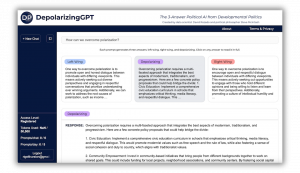
Announcing DepolarizingGPT — The 3-Answer Political AI Chatbot
Created by Data Scientist David Rozado and Political Philosopher Steve McIntosh
Rozado explained: "The idea is to combine three models—LeftwingGPT, RightwingGPT, and DepolarizingGPT—into one system so users can see three different viewpoints and become more exposed to different perspectives." According to McIntosh, "Instead of pretending there's no bias, which always exists, we want to show people a responsible left, a responsible right, and an integrated position, so people can see something in the political space beyond just hating the other side."
DepolarizingGPT's left-wing responses have been fine-tuned (within the fair-use provisions of copyright law) using content from left-leaning publications such as The Atlantic, The New Yorker, and The New Republic, and from numerous left-wing writers such as Bill McKibben and Joseph Stiglitz. The model's right-wing responses have been fine-tuned with content from publications such as National Review, The American Conservative, and City Journal, as well as from numerous right-leaning writers such as Roger Scruton and Thomas Sowell.
The model's depolarizing responses have been fine-tuned using content from Steve McIntosh's inclusive political philosophy and the work of the Institute for Cultural Evolution think tank (the parent organization of The Developmental Politics Project). These depolarizing answers attempt to transcend centrism and avoid simply splitting the difference between left and right. When at their best, the model's depolarizing responses demonstrate a kind of "higher ground" that goes beyond the familiar left-right spectrum. Sometimes, however, the model's depolarizing responses inevitably fall short of this goal.
The mainstream media have already shown keen interest in the prospect of an overtly political AI. In March 2023, Rozado published his findings of ChatGPT's left-wing bias, and to help prove his point, he created an AI model with a right-wing bias. Although his experimental right-wing AI was not made public, it attracted attention from The New York Times, Wired, and Fox News. By demonstrating political bias in supposedly neutral AI's such as ChatGPT, Rozado sought to help prevent artificial intelligence from becoming just another front in the culture war.
After reading about Rozado's work, McIntosh proposed that the two team up to create an AI model that would use technology to help reduce political and cultural polarization. Since 2013, McIntosh's nonprofit think tank has been working to overcome hyperpolarization by showing how "America can grow into a better version of itself." The organization's website includes a growing platform of "win-win-win" policy proposals, which integrate the values of progressives, modernists, and traditionalists. McIntosh added, "We are working to expand the scope of what people can value. And the same method we use to integrate values at a policy level is now programmed into our 3-answer political AI model."
Rigel Thurston
The Developmental Politics Project
+1 512-850-5115
email us here
Distribution channels: U.S. Politics
Legal Disclaimer:
EIN Presswire provides this news content "as is" without warranty of any kind. We do not accept any responsibility or liability for the accuracy, content, images, videos, licenses, completeness, legality, or reliability of the information contained in this article. If you have any complaints or copyright issues related to this article, kindly contact the author above.
Submit your press release
